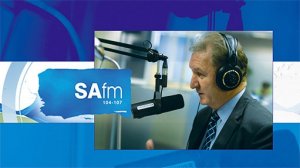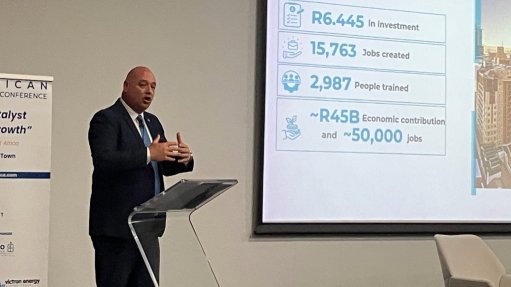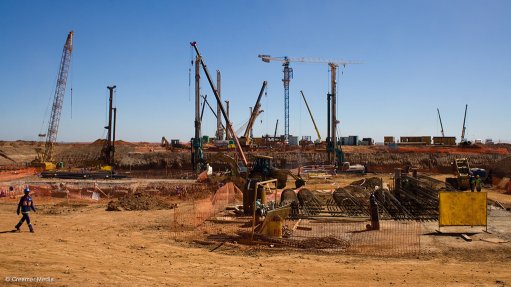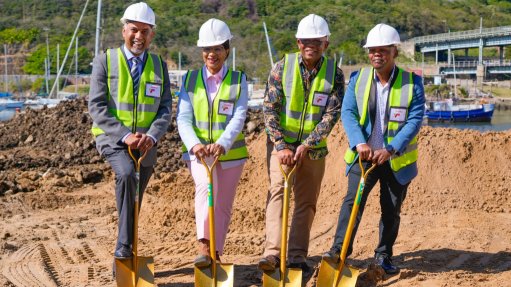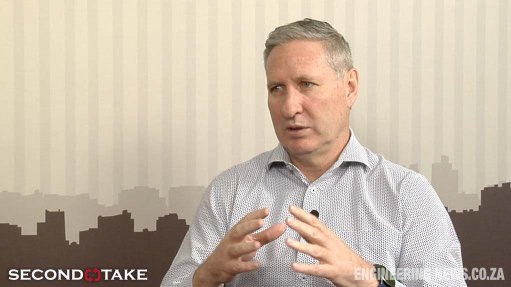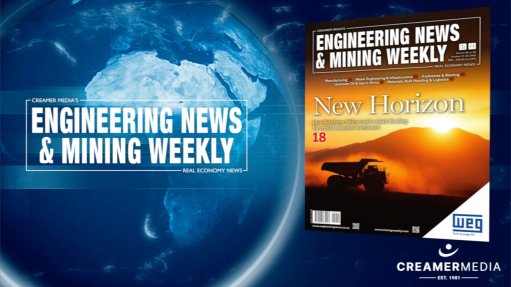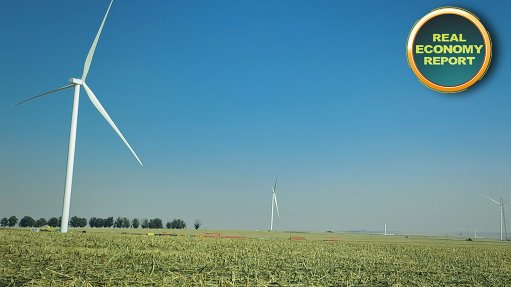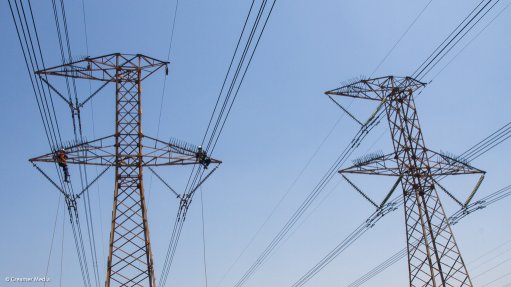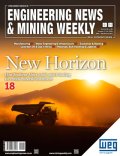On-The-Air (16/03/2018)
Every Friday morning, SAfm’s AMLive’s radio anchor Sakina Kamwendo speaks to Martin Creamer, publishing editor of Engineering News and Mining Weekly. Reported here is this Friday’s At the Coalface transcript:
Kamwendo: London analysts this week stopped discounting South African share prices thanks to South Africa’s improved political outlook.
Creamer: It has been horrible for decades, because we operate in South Africa they look at our share price and say that we must discount it. People are doing the same thing in Australia, Canada and America they get a higher value on their share, ours gets diminished.
At last the analysts have woken up from Goldman Sachs. The team said that this unwarranted and they believe that it will disappear. The sooner the better. They also did an analysis of two major companies on the Johannesburg Stock Exchange, Glencore and Anglo American and noted how the shares are below par.
They are predicting that the gap will close so that will be very good for our companies listed on the South African Stock Exchange, because of the new wind of change politically. They are saying that this operational risk should no longer manifest in a lower value in the shares.
That is important, because when one considers the investments in the share, a lot of it is pension and provident funds, so what really happens is the person comes to retire and they get hammered because that share value is less and it becomes less in their retirement benefits. Hopefully that gap will close now.
Kamwendo: A mine in the Northern Cape will be the initial beneficiary of yet another Fourth Industrial Revolution partnership clinched this week.
Creamer: South Africans are marching into the Fourth Industrial Revolution. We saw another company this week, listed on the Johannesburg Stock Exchange and it is ELB. They clinched a deal with a partner, which is very well verst in the Internet of Things and this company is called IoT.nxt. You must in future look out for this IoT because it is starting to dominate.
They say that if that IoT had been overlay on the Enterprise sausage factory in Polokwane they would have picked up the listeriosis so fast. That is what is needed now to help all these inspectors to make sure that you know what is going on. In the meantime they are applying it to a mineral processing plant. It will start at Sedibeng in the Northern Cape and overlayed along this dense media separator.
From their they hope they will step into the future and do this a lot with other mines. They saw that Exxaro last week also stepped into the this area of high technology. They are coal miners, but they are talking about also being in water security and food security.
They have got a lot of land around the mines, but they are not going to be farmers, they are going to be the technological back bone there, which could make the people who do farm there very commercially active and well healed in terms of the return they can get.
Kamwendo: Hydrogen transport was this week proposed for South Africa’s opencast mines, which would be a major boost for platinum fuel cells.
Creamer: I think that the suggestion from RTS Africa Engineering was a good one. We should hear more of this. We have got opencast mines hear and a lot of load haul dumpers and trucks going in there. We are also the biggest producers of platinum. We have been talking about this fuel cell arrangement for decades but we haven’t really got into it in a big way. We know that Impala Platinum has put R25-million into the development of load haul dumpers and busses.
That is a good start, because we need to get involved in cleaning the air ourselves. If we can do it then we can persuade a lot of the people to follow suit. When we see hydrogen transport then we should be happy, because then it should be the platinum fuel cell and the PEM fuel cell in particular, the proton exchange membrane fuel cell, because this is the one that drives the cars and buses.
It could drive these vehicles inside an opencast mine. Why not? It works best if you know where to refill with the hydrogen. So if these trucks are going in and out of this opencast mine where they are already mining platinum, why don't the platinum mines do something about it and make sure that their mines are powered by their own fuel cells using platinum. We see carbon tax coming up, surely this should be an incentive now to start moving in terms of clean energy.
The same company RTS Africa Engineering reaffirms that nothing can beat the fuel cell when it comes to cleanliness and environmental friendliness. You electric vehicle is not going to do it, because it still has spent fuel elements that cause a lot of trouble in the environment. The only changeable part in a fuel cell actually contains a platinum, so you are not going to get rid of that, because that is a precious metals. You are going to recycle it and make another fuel cell. A lot going for the idea of us promoting this fuel cell idea.
Kamwendo: The conundrum of the issue of technology in mining, how does South Africa approach that as we have a lot IT tech skills base among the pool of workers at the mines currently. What do we do with the unskilled masses once we get going on the technological route. Does he not think mining in South Africa should be left in First Industrial Revolution mode to save the jobs?
Creamer: A big word here is partnership. Another big word is ‘p’ for people. It has got to be people centered. If you go down to the research centre at the Precinct in Melville, which is a public private partnership, made up of the State and the private sector. They are there in place. What are they saying for South Africa? Keep this people centred.
They are talking about upskilling, they have got interns there and people from universities going through there making sure that they get abreast of this, because other jobs develop and it can be in significant numbers. It is not a question of just giving up, because there might be fewer people in a particular way of doing things.
They are also talking about making sure where there is certain mines that you can not change it will have to be the hand held drill and blasting technique. Why not do that better? Why not have people with lighter equipment. Normally there is a big joke, because they say if you have got to go work underground in a mine you have to do weightlifting first to have big strong muscles, because you have got to hold these big drills.
Make it lighter and more efficient and quicker and consider going around the clock. The way we are doing it at the moment with the blasting, make sure we cant do that the people have to get out the mine and then the blast takes place. Then all the dust is there and they clean out. It is a very inefficient way of doing it. Perhaps we can do it differently but still using the muscles of the people that are in that business and getting them down there and making them more productive.
So we are going to this Fourth Industrial Revolution, we have got to, otherwise we are going to fall behind. We are already badly behind and you can see the mining companies stepping into it. They have already got to take partners, because they haven’t got the homegrown skills. All they are talking about is skills, skills development, how to deal with this and they are using the word people centred which is great for South Africa, because it will give people better jobs.
Kamwendo: Thanks very much. Martin Creamer is publishing editor of Engineering News and Mining Weekly.
Article Enquiry
Email Article
Save Article
To advertise email advertising@creamermedia.co.za or click here
Comments
Announcements
What's On
Subscribe to improve your user experience...
Option 1 (equivalent of R125 a month):
Receive a weekly copy of Creamer Media's Engineering News & Mining Weekly magazine
(print copy for those in South Africa and e-magazine for those outside of South Africa)
Receive daily email newsletters
Access to full search results
Access archive of magazine back copies
Access to Projects in Progress
Access to ONE Research Report of your choice in PDF format
Option 2 (equivalent of R375 a month):
All benefits from Option 1
PLUS
Access to Creamer Media's Research Channel Africa for ALL Research Reports, in PDF format, on various industrial and mining sectors
including Electricity; Water; Energy Transition; Hydrogen; Roads, Rail and Ports; Coal; Gold; Platinum; Battery Metals; etc.
Already a subscriber?
Forgotten your password?
Receive weekly copy of Creamer Media's Engineering News & Mining Weekly magazine (print copy for those in South Africa and e-magazine for those outside of South Africa)
➕
Recieve daily email newsletters
➕
Access to full search results
➕
Access archive of magazine back copies
➕
Access to Projects in Progress
➕
Access to ONE Research Report of your choice in PDF format
RESEARCH CHANNEL AFRICA
R4500 (equivalent of R375 a month)
SUBSCRIBEAll benefits from Option 1
➕
Access to Creamer Media's Research Channel Africa for ALL Research Reports on various industrial and mining sectors, in PDF format, including on:
Electricity
➕
Water
➕
Energy Transition
➕
Hydrogen
➕
Roads, Rail and Ports
➕
Coal
➕
Gold
➕
Platinum
➕
Battery Metals
➕
etc.
Receive all benefits from Option 1 or Option 2 delivered to numerous people at your company
➕
Multiple User names and Passwords for simultaneous log-ins
➕
Intranet integration access to all in your organisation



